Medicine tutoring provides personalized guidance for students in medicine-related subjects. Online tutors can offer expert homework and assignment help, often boosting grades and confidence. Convenient online tutoring sessions fit busy schedules.
Imagine a high school student named Sarah who dreams of a career in medicine. She attends demanding biology and chemistry classes but still struggles to master complex concepts. Worried about upcoming exams, Sarah seeks extra support beyond the classroom. This is where a medicine tutor can make a difference by providing one-on-one help tailored to her needs. Around the world – in the USA, UK, Gulf states, and beyond – students seek tutors for science and medicine courses.
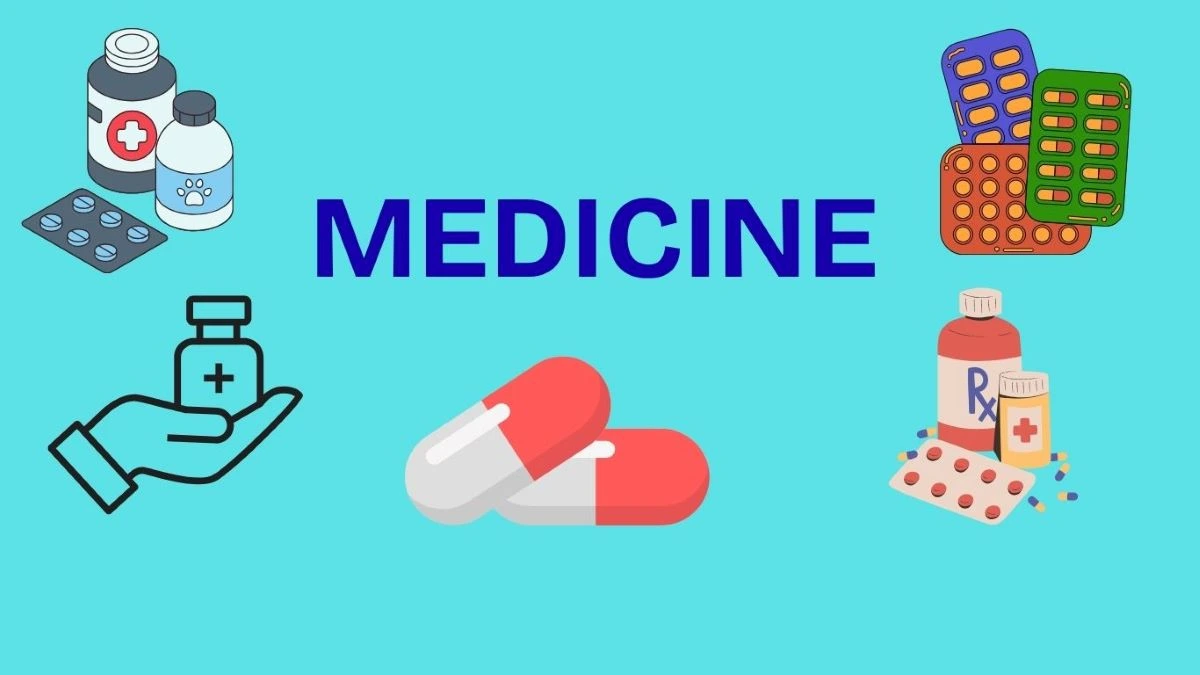
For another example, consider James, a college freshman tackling organic chemistry and physiology. After just a few tutoring sessions with an expert, he saw his confidence and test scores rise. These stories illustrate how personalized tutoring can transform a student’s experience. Rather than feeling left behind, a student can make faster progress with dedicated support and guidance.
Even teachers and parents notice the difference. With a tutor handling difficult concepts, classroom time can focus on new material. Tutors provide a safety net, ensuring students don’t fall through the cracks. Together, tutors, parents, and teachers form a strong support team for each learner. After all, even a great classroom medicine teacher can’t spend extra time with every student. A tutor fills that gap by going at the student’s pace.
A medicine tutor is typically an experienced teacher, healthcare professional, or advanced student who helps learners review difficult topics. Many tutors are practicing nurses, medical students, or professors with experience in medical or biological fields. They offer customized lessons in subjects like anatomy, physiology, or pharmacology.
With individual attention, a tutor can adapt explanations to a student’s style and pace, filling gaps that group lessons may leave. Tutors might use diagrams, models, and storytelling to make complex content memorable. For example, a tutor might draw a physiology diagram to visualize blood flow. This approach often leads to deeper understanding and confidence for the student.
What Is Medicine Tutoring?
Understanding the difference between a crowded lecture hall and personalized support is key. The visual below highlights how one-on-one sessions shift the focus entirely to your learning needs.

Personalized medicine tutoring bridges the gap between crowded lectures and your individual learning needs.
As you can see, the direct engagement of a private tutor eliminates the ‘lost in the crowd’ feeling common in medical school.
Medicine tutoring dates back centuries, rooted in mentorship and apprenticeship. In Latin, “tutor” means “guardian,” reflecting how a tutor protects and guides a student’s learning. Today, a medicine tutor can be a subject expert or advanced student working one-on-one with a learner. They clarify complex topics that may not get enough time in class, such as intricate biochemical pathways or medical terminology. Tutors tailor explanations, visual aids, and practice exercises to each student’s understanding. Many students are drawn to this individualized support, and research shows that demand for personalized tutoring is growing.
Why Medicine Tutoring?
A medicine tutor complements classroom teaching by providing focused attention. Instead of a one-size-fits-all lecture, tutoring addresses each student’s specific challenges. Studies indicate this has a powerful impact: intensive tutoring can help struggling students catch up by roughly half a year to a full year of learning. For example, at one college, students who used tutoring had a 76% pass rate compared to 69% for their peers. That extra support often translates to tangible improvements in grades and confidence.
Does tutoring actually work? The data speaks for itself when comparing pass rates of tutored students versus their peers.
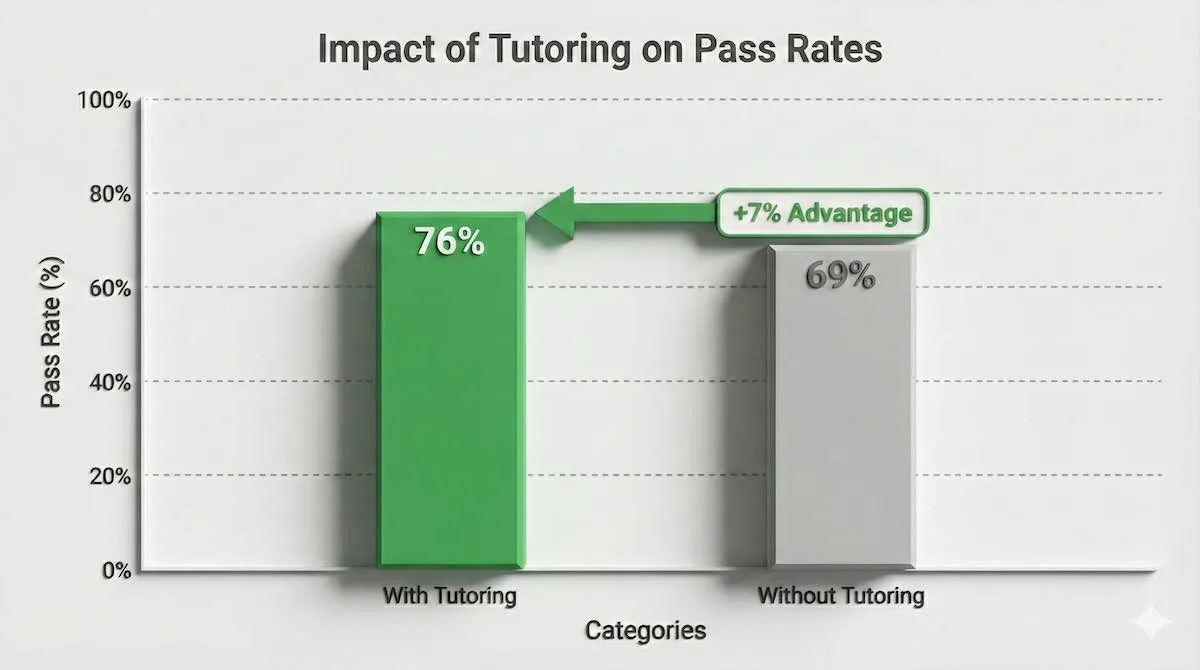
Statistical data confirms that students who use medicine tutoring achieve significantly higher pass rates.
That 7% difference often represents the crucial margin between passing a difficult year and having to repeat it.
- Personalized attention: Tutors focus on the student’s specific needs, reinforcing areas of difficulty.
- Flexible scheduling: Sessions can be arranged at convenient times, fitting study around other activities.
- Subject expertise: Tutors often specialize in medicine and related sciences, explaining topics like anatomy or physiology step by step.
- Homework and exam help: Tutors guide students through homework, assignments, and test preparation, building skills and confidence.
- Motivation and confidence: A tutor supports and encourages the student, helping build confidence and enthusiasm for learning.
- Improved performance: Tutors can boost grades and test scores, and research confirms they build stronger study habits and confidence.
Research shows that high-impact tutoring produces larger learning gains than many other interventions. Students who get regular tutoring often see real grade improvements and feel less anxious about tests. For example, one study found that students using tutoring services had about a 7% higher pass rate than similar students without tutoring. For parents, this means less worry about grades; for students, it means enjoying learning again.
Some families even search for “medicine homework help” or “medicine assignment support” when looking for tutors, because these services guide students through tough problems step by step. For example, instead of just giving answers, a tutor will walk through each step of a complex homework problem to ensure the student truly understands.
Globally, families invest heavily in tutoring. U.S. parents spent around $25 billion on private tutoring in 2021, and in the UK the industry was worth about £7.5 billion in 2019–2020. In the Middle East and Africa, the private tutoring market was valued at USD 22.00 billion in 2024. In total, the global private tutoring market was about $91.6 billion in 2022. These figures show how many people around the world recognize the value of one-on-one learning support. Tutors have become an important part of education for many.
Large lecture halls and busy classrooms can leave students with unanswered questions. A private medicine tutor, by contrast, tailors each session to one student (or a small group) at a time. Students feel free to ask questions instead of staying silent in a crowd. This one-on-one approach often leads to faster understanding. Studies show that students who get tutoring improve their grades and confidence significantly.
Tutoring isn’t only for students who are falling behind. High achievers often use tutors to reach the next level. For instance, a student aiming for top scores on advanced exams or medical school admissions might use tutoring for extra challenge. An athlete balancing sports and studies might work with a tutor to maintain a high GPA. Even students returning to study (like nurses or technicians furthering their education) find tutors helpful. In short, medicine tutoring can benefit learners at many levels and for many goals.
Medicine Tutoring Online
Still undecided between online and face-to-face options? This comparison table breaks down the key differences in cost, flexibility, and resources.
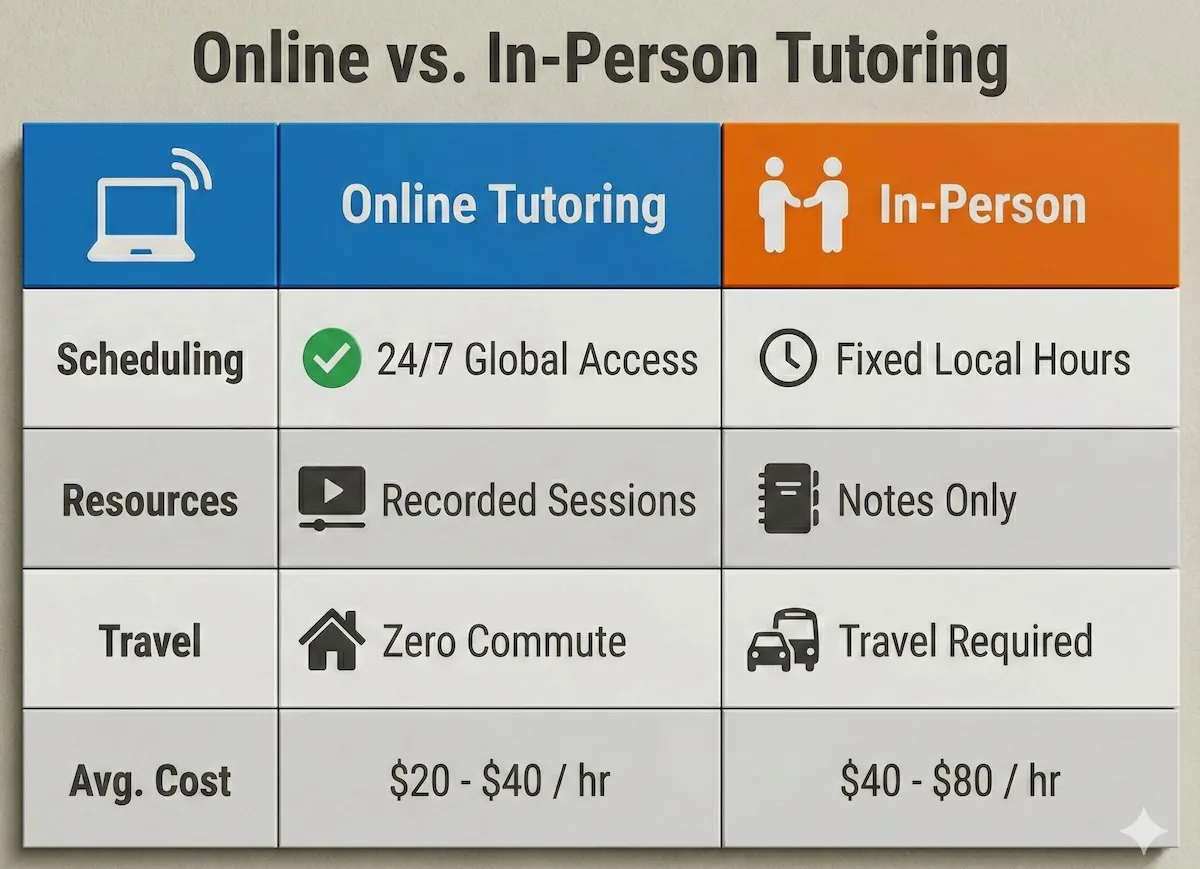
Compare the flexibility and cost-effectiveness of online tutoring against traditional in-person options.
For many medical students, the ability to re-watch recorded sessions makes online tutoring the clear winner for exam revision.
Online platforms now allow students to work with medicine tutors from anywhere. Students in the U.S., UK, Gulf countries, or elsewhere can connect with a tutor via video call or online session. Recent studies find that virtual tutoring can be as effective as face-to-face sessions. This was especially true during the COVID-19 pandemic, when demand for online tutoring surged and has remained high after lockdowns ended.
In virtual sessions, tutors often use interactive whiteboards, screen sharing, and even 3D models to explain concepts. The convenience is a big advantage: students can learn at home (or on the go) without travel time.
- Interactive tools: Many online tutors use video chat, virtual whiteboards, and simulators (like 3D anatomy models) to make lessons engaging.
- Flexible access: Students can connect with tutors in different time zones, and many platforms allow recording sessions or messaging with the tutor between lessons.
There are additional perks to online medicine tutoring. Some tutors share recordings of lessons or extra practice materials for review. Others use mobile apps to quiz students or demonstrate anatomy with augmented-reality simulations. For example, a tutor might use an app to let a student “dissect” a virtual heart while explaining its function. All these tools make learning more engaging. Plus, online tutoring eliminates travel time: a student can log in at the most convenient time, fitting sessions around other commitments each week.
Technology has transformed how we learn complex anatomy. Here is a glimpse of the immersive tools modern online tutors use to explain physiological concepts.
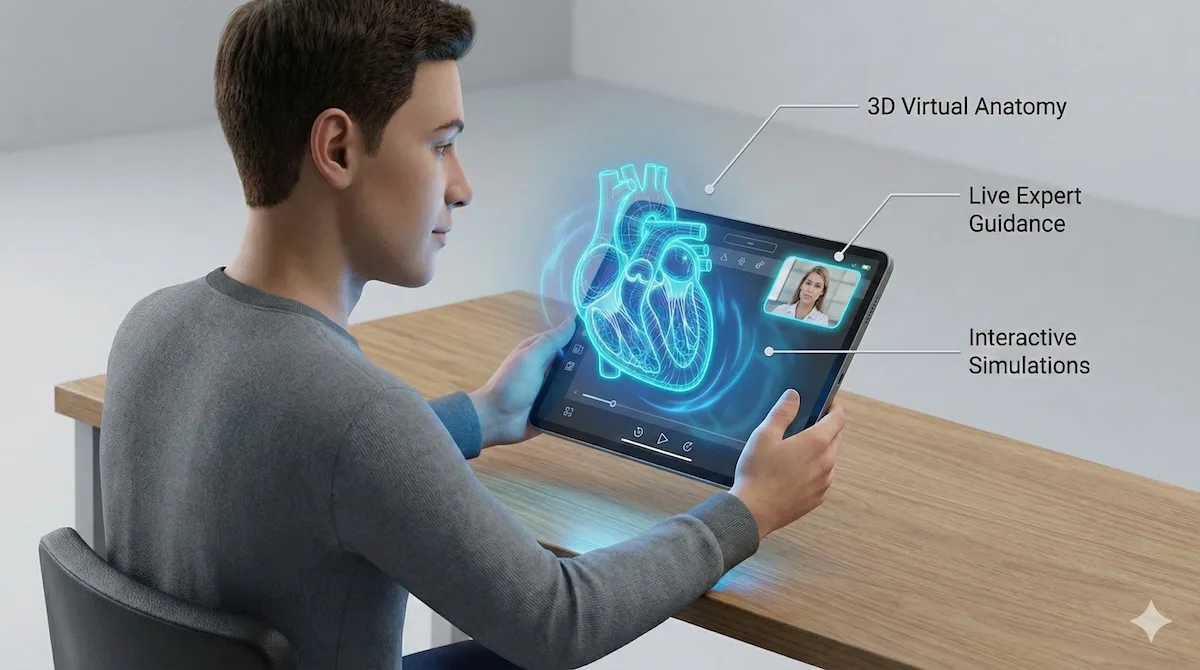
Modern online medicine tutoring utilizes advanced 3D simulations and augmented reality for immersive learning.
These interactive 3D tools make abstract concepts tangible, helping you retain information far better than static textbook images.
Finding a Medicine Tutor
Ready to get help but don’t know where to start? Follow this step-by-step roadmap to find a tutor who matches your academic goals.
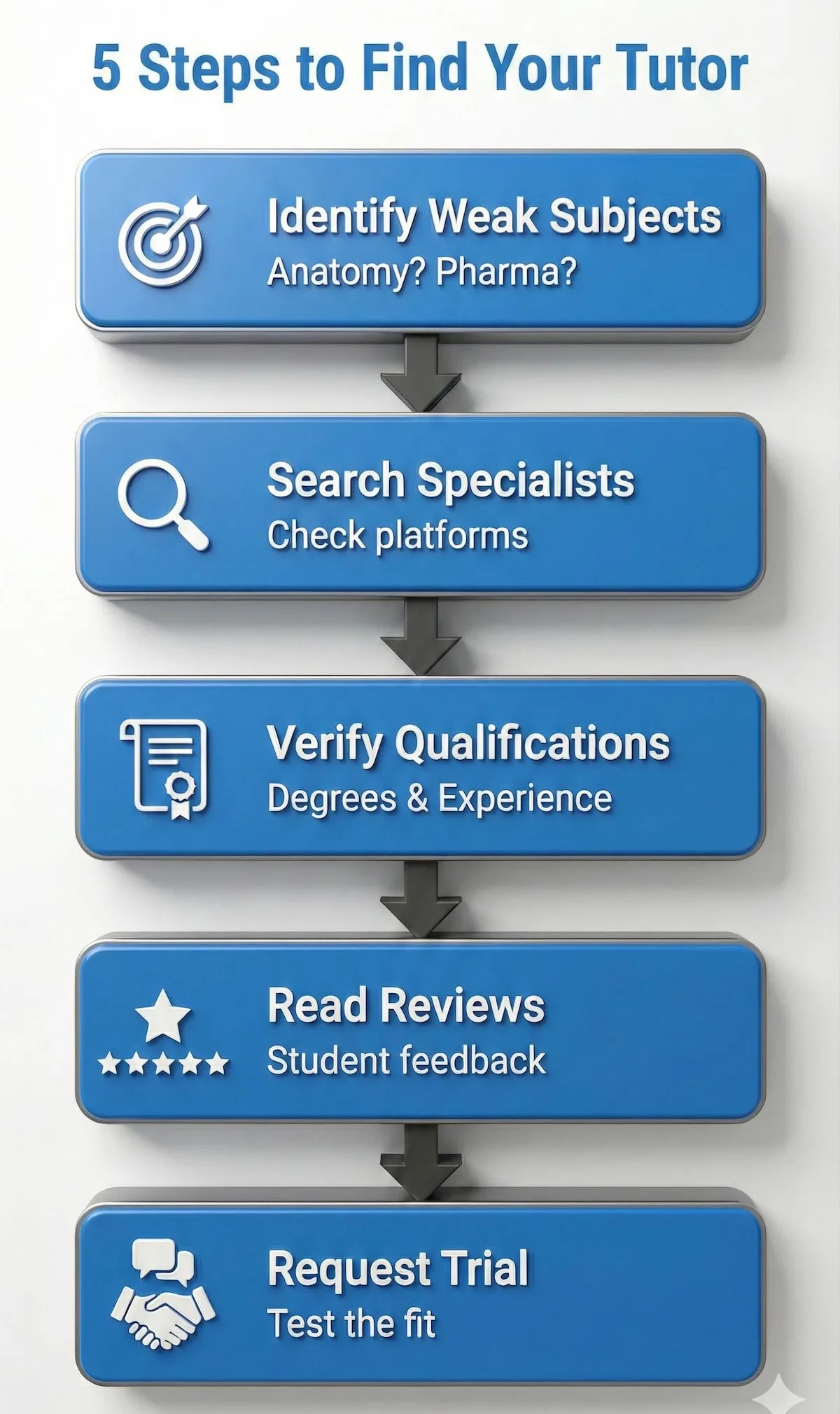
Follow this simple 5-step process to find and hire the perfect medicine tutor for your specific needs.
By following these five steps, you ensure that you invest in a qualified expert rather than just a generic helper.
Choosing the right tutor is important. Look for a tutor with strong subject knowledge, such as a degree in a medical or health science field or clinical experience. Many great tutors are practicing professionals (nurses, pharmacists, physicians) or former professors. Equally important are teaching skills. A great tutor is patient, listens carefully, and explains ideas clearly.
Try to find tutors who can provide references or success stories from other students. Many online platforms let you filter tutors by qualifications and background, so you can hire a medicine tutor who fits your academic level and needs.
Follow these steps to find a good tutor:
- Identify the specific subjects or topics you need help with (for example, human anatomy, biochemistry, or physiology).
- Search for tutors experienced in those areas. Check their qualifications, such as relevant degrees, certifications, or teaching experience.
- Read reviews or ask for a trial session to ensure the tutor’s teaching style matches the student’s needs and learning style.
- Discuss goals with the tutor (like homework help, lab report guidance, or exam prep) and schedule regular sessions.
- Use trusted tutoring platforms, local agencies, or school recommendations when you hire a medicine tutor. Verify any credentials they claim.
- Arrange a consistent plan: regular weekly lessons and clear goals help maintain steady progress.
Many tutoring websites and agencies make it easy to connect with qualified instructors. They typically let you view tutor profiles, book sessions, and securely handle payments. It’s usually a good idea to start with a trial lesson to make sure the tutor is a good fit. Once matched, an effective tutor will quickly pinpoint weak areas and focus on them. For example, a tutor might create custom practice quizzes or share mnemonic devices to help memorize facts. The results can be dramatic: students often gain confidence and master material they once found overwhelming.
A good tutor does more than just explain concepts; they also teach study skills and exam strategies. For instance, a tutor might show effective note-taking techniques, how to create study guides, or ways to manage time efficiently. These skills help students succeed not only in medicine but across all subjects.
Remember that costs vary. Most specialized tutors charge around $20–$40 per hour depending on their expertise and demand. Some tutors or platforms offer discounts for multiple sessions or group lessons. Consider group tutoring or studying with friends to reduce costs. Importantly, weigh the cost against the benefit of improved performance and reduced stress. Many families find that the investment pays off in better grades and exam results.
FAQs
Q1 What is medicine tutoring?
One-on-one instruction in medical or science subjects from a qualified tutor to help students master challenging concepts.
Q2 How can a medicine tutor help?
A medicine tutor provides personalized instruction, clarifies difficult topics, and offers homework and assignment support to improve understanding.
Q3 What subjects do medicine tutors cover?
Tutors often cover topics like anatomy, physiology, biochemistry, pharmacology, and other science courses at the high school or college level.
Q4 Is medicine tutoring available online?
Yes, many qualified medicine tutors offer online tutoring through video chat, enabling students to connect with experts from home or school.
Q5 How do I hire a medicine tutor?
You can hire a medicine tutor by searching reputable tutoring platforms or agencies and choosing a qualified instructor who meets your academic needs and budget.
Q6 How much does a medicine tutor cost?
Rates vary, but many medicine tutors charge around $20–$40 per hour depending on their expertise and the course’s difficulty level.
Related Subjects
Anesthesiology
Biopharmaceuticals
Cardiology
Clinical Research
Computed Tomography (CT)
Computer-Aided Drug Design (CADD)
Dentistry
Dermatology
Dietetics
Drug Metabolism
Fluoroscopy
Gastroenterology
General surgery
Gerontology
Gross anatomy
Hematology
Medical ethics
Midwifery
Molecular Modeling & Drug Design
MRI (Magnetic Resonance Imaging)
Nephrology
Neurology
Nuclear Medicine
Nursing
Obstetrics and gynecology
Orthopedic Surgery
Pathophysiology
Pediatrics
Preventive medicine
Public Health
Pulmonology
Radiation therapy (Radiotherapy)
Radiobiology
Radiology
Reproductive & Sexual Health
Surgery
Systemic pathology
Ultrasound Physics
******************************
This article provides general educational guidance only. It is NOT official exam policy, professional academic advice, or guaranteed results. Always verify information with your school, official exam boards (College Board, Cambridge, IB), or qualified professionals before making decisions. Read Full Policies & Disclaimer , Contact Us To Report An Error

